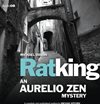Schindler's Ark
by Thomas Keneally
"In the shadow of Auschwitz, a flamboyant German industrialist grew into a living legend to the Jews of Cracow. He was a womaniser, a heavy drinker and a bon viveur, but to them he became a saviour."This was a tough read. I think I am becoming more sensitive as I get older, but maybe I haven't read accounts of the atrocities of the Holocaust like this one. I still find the character of Oskar Schindler himself fascinating - a successful industrialist before the war, a passionate activist during the time described in the book, and then managed nothing very successful afterwards. This one act that he carried out with considerable risk and cost to himself stands out not only because of its utterly heroic nature, but also because he shows no similar character or action before or after the war. No matter - he deserves no less recognition because of that.
Ratking
by Michael Dibdin
narrated by Michael Kitchen
"Italian Police Commissioner Aurelio Zen is dispatched to investigate the kidnapping of Ruggiero Miletti, a powerful Perugian industrialist. But nobody much wants Zen to succeed: not the local authorities, who view him as an interloper, and certainly not Miletti's children, who seem content to let the head of the family languish in the hands of his abductors."This only confirms my existing conclusion that I can't follow this kind of 'police procedural' novel in the audio form - I forget who is who, and it wasn't helped this time by leaving fairly long periods between listens. But despite this it's quite good, although I won't be seeking out any more books in the series.
Psmith in the City
by P. G. Wodehouse
narrated by B. J. Harrison
"Mike Jackson, cricketer and scion of a cricketing clan, finds his dreams of studying and playing at Cambridge upset by news of his father's financial troubles, and must instead take a job with the New Asiatic Bank. On arrival there, Mike finds his friend Psmith is also a new employee, and together they strive to make the best of their position, and perhaps squeeze in a little cricket from time to time."Not one of his best, perhaps, because he's put upper-class Psmith to work in a bank in order to create the dramatic scenario, and the caricatures of other employees are barely recognisable. So the story is a bit far-fetched, and there's nothing particularly to recommend it.
The Count of Monte Cristo
by Alexandre Dumas
"Thrown in prison for a crime he has not committed, Edmond Dantes is confined to the grim fortress of If. There he learns of a great hoard of treasure hidden on the Isle of Monte Cristo and he becomes determined not only to escape, but also to unearth the treasure and use it to plot the destruction of the three men responsible for his incarceration."A humongous read - the paperback is about four inches thick, which is what put me off the audio version and made me go to the library to borrow a copy. Great move, I thought, until someone else reserved it, so I had to give it back when I'd got just a third of the way through and wait for three weeks before I could borrow it again. But despite the intermission it's good, very good, and the story rolls along at the right pace and with the right amount of detail and action, and the whole cast of characters is introduced so that you don't forget who they are. A cracking story.
The Mighty Micro
by Christopher Evans
"A computer in your wrist watch, a car that refuses to start if the driver is drunk, a micro-chip book instead of a paperback... Science fiction? No, by the year 2000, all these and much more will be part of our everyday lives."This book was written in 1979, and contains the author's predictions for how computing would progress in the short, medium and long term, reaching all the way to 2000. He foresaw many of today's uses of microchips - electronic books (although he wrongly predicted the demise of paper), flat-screen TVs, ubiquitous computing, a network of computers, and the addictive properties of computer games. He got some things spectacularly wrong - a twenty-hour working week, personalised education and Ultra Intelligent Machines, and he anticipated the influence of computers in medicine, but thought they would be replacing diagnostic physicians rather than assisting surgeons.
As I Lay Dying
by William Faulkner
narrated by Marc Cashman, Robertson Dean, Lina Patel, Lorna Raver
"The death and burial of Addie Bundren is told by members of her family, as they cart the coffin to Jefferson, Mississippi, to bury her among her people."I knew that I enjoyed the way that Faulkner wrote 'The Sound and The Fury' (looking back at my review, I enjoyed it even more than I remember), which is why I chose to read this one. Which I also enjoyed, even though it's completely nuts. Not quite as confusing in its time line and character names as the other, but still crazy, and written in a voice (voices) like no other author's in my experience. Taking the seriously decomposing body in July heat to its resting place involves falling in a river, drowning the mules pulling the cart, breaking a leg which is then given a cast made of builders' cement, burning down a barn and getting sent to the asylum, failing to get an abortion, and getting new teeth, a gramophone, and a new wife. What a ride.
Foundation
by Isaac Asimov
"To preserve knowledge and save mankind, Hari Seldon gathers the best minds in the Empire - both scientists and scholars - and brings them to a bleak planet at the edge of the Galaxy to serve as a beacon of hope for a future generations. He calls his sanctuary the Foundation."Now, this is peculiar. The first time I read this book, which could have been in the 1990's or even earlier, I liked it enough to want to buy the next two in the trilogy. This time round it doesn't have that effect at all; I found it lacked cohesion, spread over too long a time period, no character development... But I still have the subsequent books so I'll read them and see if it gets better.












